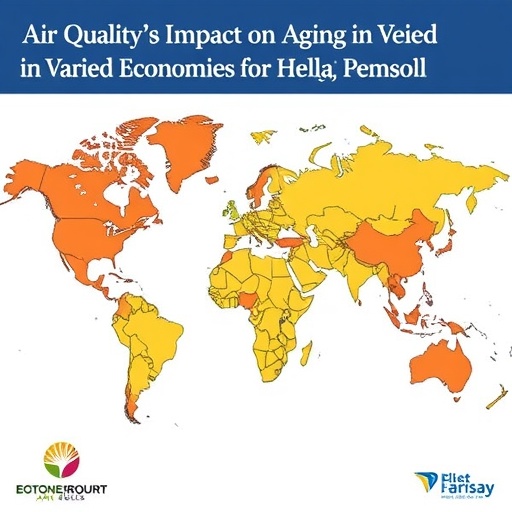In recent years, there has been a growing body of research highlighting the intricate relationship between air quality and various health outcomes, notably among aging populations. The study conducted by I. Abid sheds light on this pressing issue, comparing data from economies characterized by high and low levels of air pollution. As public awareness of environmental health impacts continues to rise, understanding how air quality influences aging could have significant implications for public health policy and individual well-being.
At the heart of this study lies the hypothesis that deteriorating air quality adversely affects the physiological processes associated with aging. The aging population is particularly susceptible to environmental stressors, given that older adults often have pre-existing health issues that can be exacerbated by poor air conditions. This vulnerability necessitates a closer examination of how air pollutants interact with age-related physiological changes.
Abid’s research meticulously analyzes various air pollutants, including particulate matter, nitrogen dioxide, and sulfur dioxide. These pollutants are known to infiltrate the respiratory system and pose direct health risks. By looking at populations in both high and low pollution economies, this study aims to illustrate stark differences in health outcomes attributable to environmental quality. This dual-analysis not only contextualizes the findings but also prompts vital questions regarding socioeconomic disparities in health.
One striking observation from the study is the differential impact of pollution on aging-related ailments such as cardiovascular diseases, respiratory conditions, and cognitive decline. In high pollution environments, older adults exhibited significant declines in lung function and increased rates of hospitalization due to respiratory complications. Conversely, in low pollution economies, the health status of older individuals was notably better, highlighting the protective effects of cleaner air.
Another critical aspect examined in the study is the role of public health interventions in mitigating the impacts of air pollution on aging populations. Innovative strategies, such as urban greening, improved transportation systems, and stringent emission regulations, have demonstrated efficacy in enhancing air quality in urban settings. These proactive measures not only contribute to better environmental conditions but also underscore the necessity for governmental organizations to prioritize clean air initiatives as part of comprehensive health strategies.
Furthermore, the data utilized in Abid’s research is robust, consisting of longitudinal studies and health records from various demographics. This comprehensive approach allows for a nuanced understanding of how exposure to air pollutants over time correlates with aging processes. The findings suggest that prolonged exposure may accelerate biological aging indicators, including inflammatory markers and oxidative stress levels.
One of the more thought-provoking conclusions of the study is the acknowledgement of climate change as an exacerbating factor in air quality degradation. The interplay between environmental changes and pollution levels raises concerns about future health outcomes for aging populations, especially in developing nations where industrial growth is prevalent and regulations may not be as stringent. As climate-related phenomena become more frequent, the urgency for actionable strategies becomes undeniable.
The implications of Abid’s findings extend beyond individual health, raising significant questions for socioeconomic policy. Countries with higher pollution levels often face economic disadvantages as healthcare costs escalate due to increased illness among older populations. This cycle perpetuates inequality, as communities with limited resources struggle to implement effective health and environmental policies. Thus, enhancing air quality emerges as a necessity not only for health improvement but also for economic stability.
Moreover, public awareness and community engagement are paramount in addressing air quality issues. Advocacy for cleaner air can lead to grassroots movements that persuade policymakers to enact more stringent regulations. Education on the harmful effects of air pollution, especially in relation to aging, can empower communities to make more informed choices regarding their environments and health.
Moreover, the potential benefits of community-based interventions to improve air quality are profound. The study indicated that when communities are involved in interventions aimed at reducing pollution, outcomes tend to be more favorable. Engaging local stakeholders can foster a sense of ownership over air quality initiatives, ultimately leading to better public health outcomes.
In light of these findings, it is crucial for future research to delve deeper into individualized responses to air pollution among aging populations. Genetic predispositions and lifestyle factors may modulate the effects of air pollutants, and understanding these interactions could pave the way for personalized interventions.
As cities continue to grow and industrial activities escalate, the importance of Abid’s work cannot be overstated. The potential health risks posed by air quality deterioration, particularly for aging populations, necessitate urgent attention from public health officials, urban planners, and policymakers. The evidence presented serves as a clarion call for a multifaceted approach to improving air quality, thereby safeguarding the well-being of vulnerable citizens.
In conclusion, the dialogue surrounding air quality and aging must expand to incorporate holistic views that align public health and environmental sustainability. As we move toward the future, integrating findings like those of Abid’s research into actionable policies will be vital in fostering healthier populations. The intersection of clean air initiatives with strategies for healthy aging will ultimately shape the way societies address the challenges posed by environmental health issues.
Subject of Research: Air Quality and Aging
Article Title: Air quality and aging: comparative evidence from high and low pollution economies
Article References:
Abid, I. Air quality and aging: comparative evidence from high and low pollution economies.
Discov Sustain 6, 1211 (2025). https://doi.org/10.1007/s43621-025-02110-y
Image Credits: AI Generated
DOI: https://doi.org/10.1007/s43621-025-02110-y
Keywords: Air Pollution, Aging, Public Health, Environmental Health, Socioeconomic Disparities, Climate Change, Health Outcomes, Community Engagement, Policy Initiatives, Longevity, Respiratory Health, Cardiovascular Diseases, Public Awareness, Grassroots Movements.




